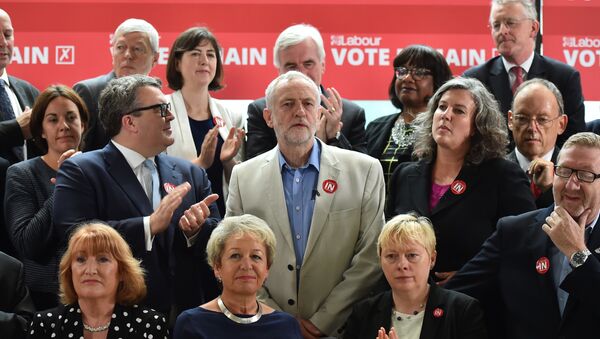He has called for the re-nationalization of the railways and public utilities, the scrapping of university tuition fees and the abandonment of a nuclear deterrent. He spent years defying the whip and voting against policies promoted by the centrist Tony Blair and Gordon Brown, when they led the party.
Corbyn's meteoric rise to fame came as a result of a groundswell of opinion within the Labour movement that Blair and Brown had taken the party too far to the right. There was deep resentment of Blair's decision to go to war against Iraq and Corbyn won plaudits for his vehement campaign against the action.
You have until 5pm today to sign up — to have your say in the Labour Leadership election → https://t.co/lEGgCGDqWXhttps://t.co/hYts8Q3irA
— Jeremy Corbyn MP (@jeremycorbyn) 20 July 2016
After Labour lost its second election, in 2015, Corbyn won the leadership because of a huge rise in support from the left in constituencies up and down the country as well as the unions. However, his success split the Parliamentary Labour Party (PLP) — the Labour MPs — many of whom were Blairites and Brownites who did not share Corbyn's views.
Corbyn's lackluster support for the campaign to keep Britain inside the EU caused great anger within the party, who blamed him for not being clear on the party's pro-EU policy and sending out mixed signals. He lost a vote of no-confidence by the PLP, following the referendum, and is now facing a challenger.
Right Wing Challenger
That comes in the form of Owen Smith, who has — like Corbyn emerged from the sidelines to challenge for the leadership.
He is an MP in Wales, worked for ten years at the BBC and in the pharmaceutical industry as a lobbyist for five years. He won his seat in parliament in 2010 and was subsequently appointed shadow Secretary of State for Wales by Ed Miliband, giving him frontbench experience that Corbyn lacks.
.@owensmith2016 launches leadership bid in speech without notes.
— Owen Smith 2016 (@owensmith2016) 17 July 2016
Proud socialist, speaking from the heart! pic.twitter.com/yQOJacMfSP
Smith represents the majority of Labour MPs, who believe that the move to the right — promoted by Blair and Brown — brought the party to power in 1997 after years in the wilderness and that a lurch to the left — under Corbyn — will leave the party unelectable.
However, Smith has a low profile nationally. Corbyn is much more well-known and enjoys huge support among anti-war and anti-nuclear campaigners. Labour's membership has more than doubled since Corbyn was elected. More than 130,000 people have joined the party since the referendum on June 23, most of them to support him against the right.
It will be a long campaign — the result will not be known until September 24 — and Smith has his work cut out to lift his profile among the grassroots. What's for certain is that Corbyn has opened a Pandora's box that pits the left and right wings of his party against each other. If Corbyn wins again — the party is likely to split.



